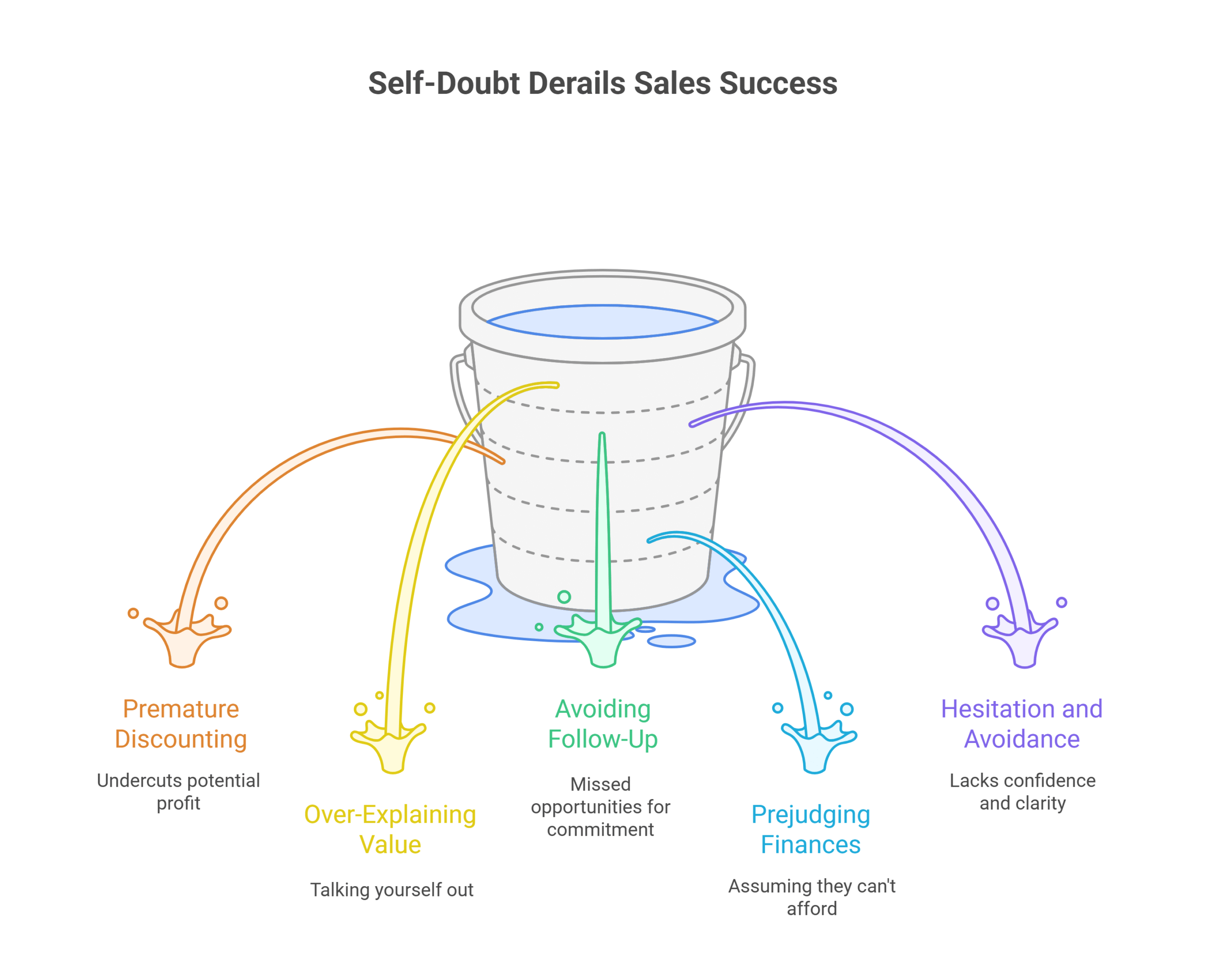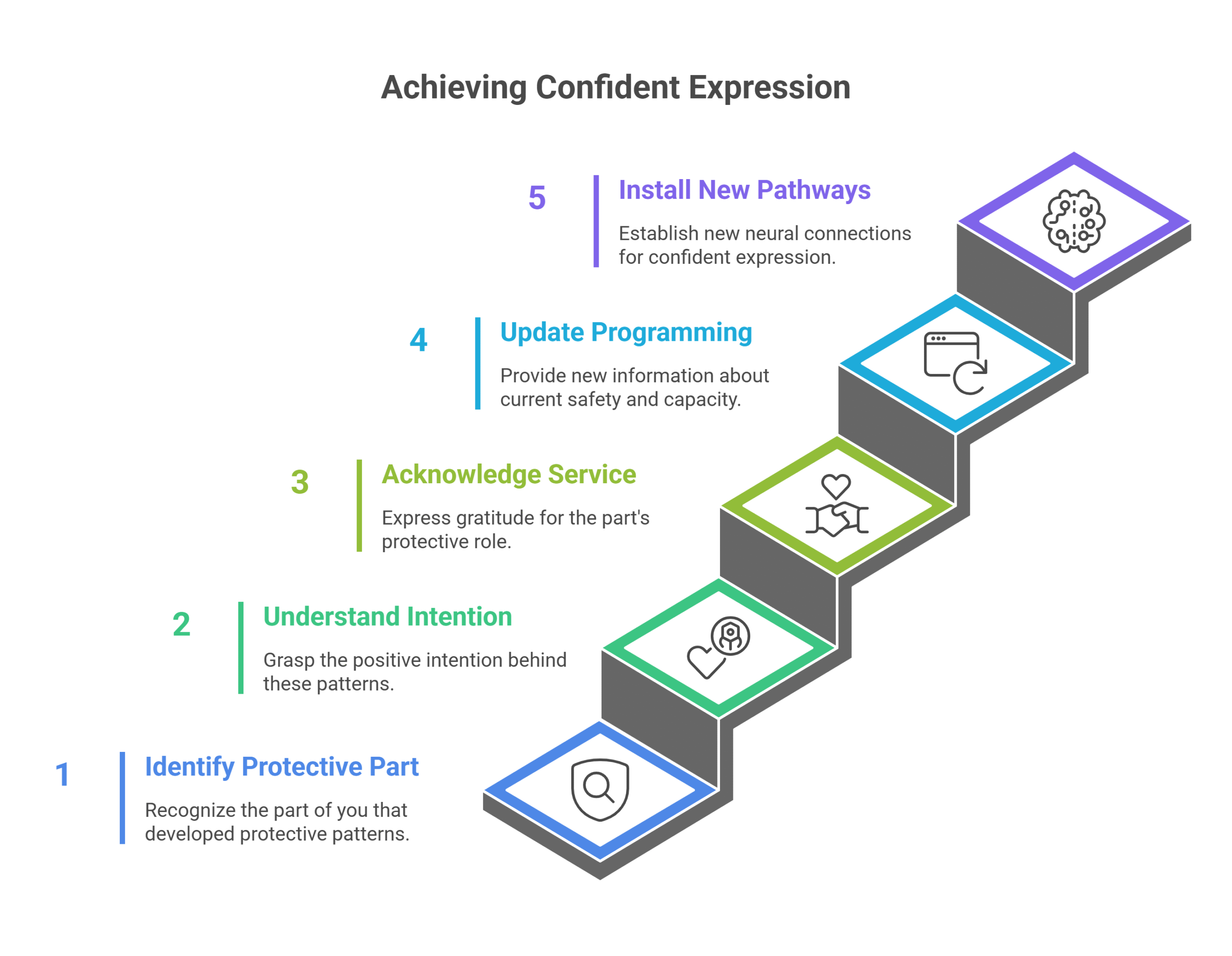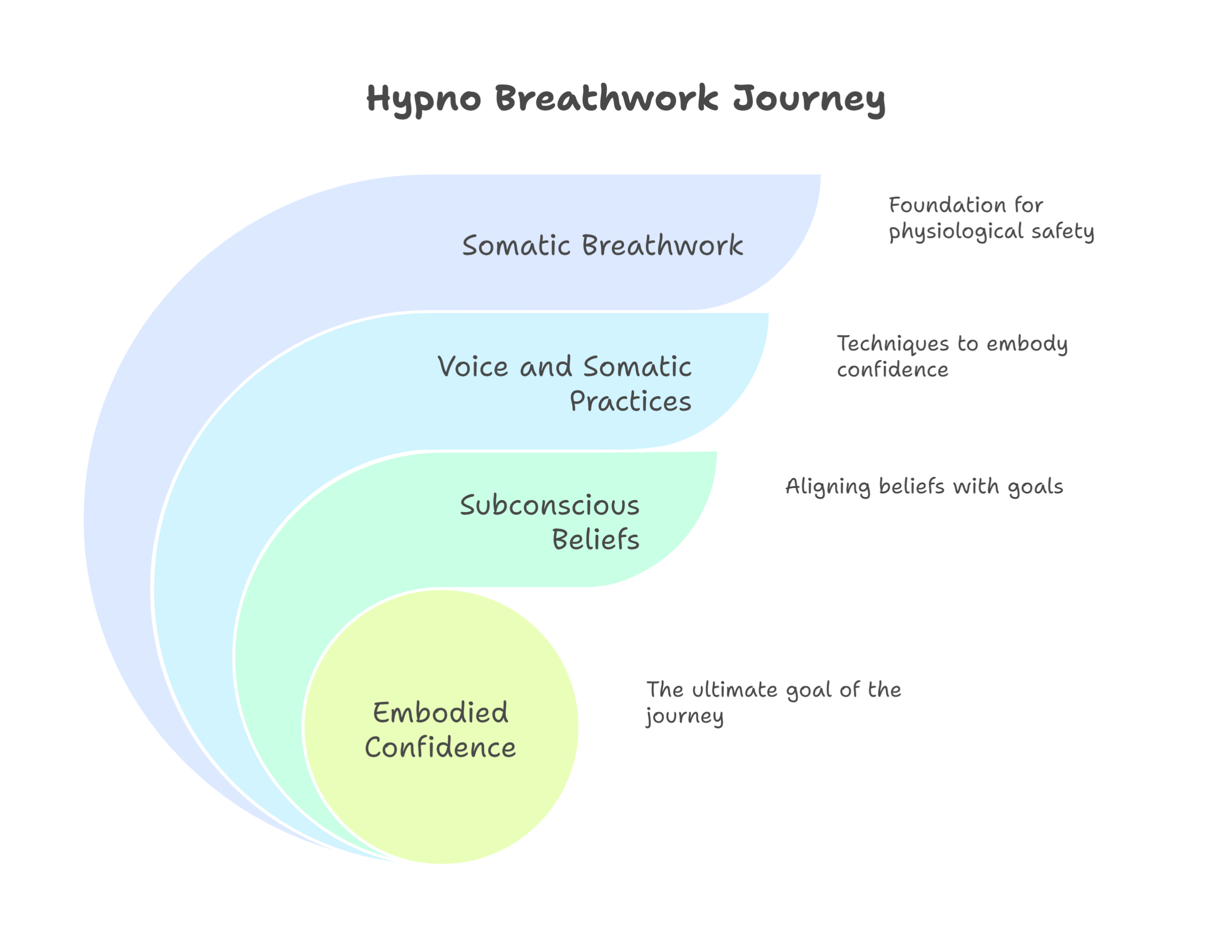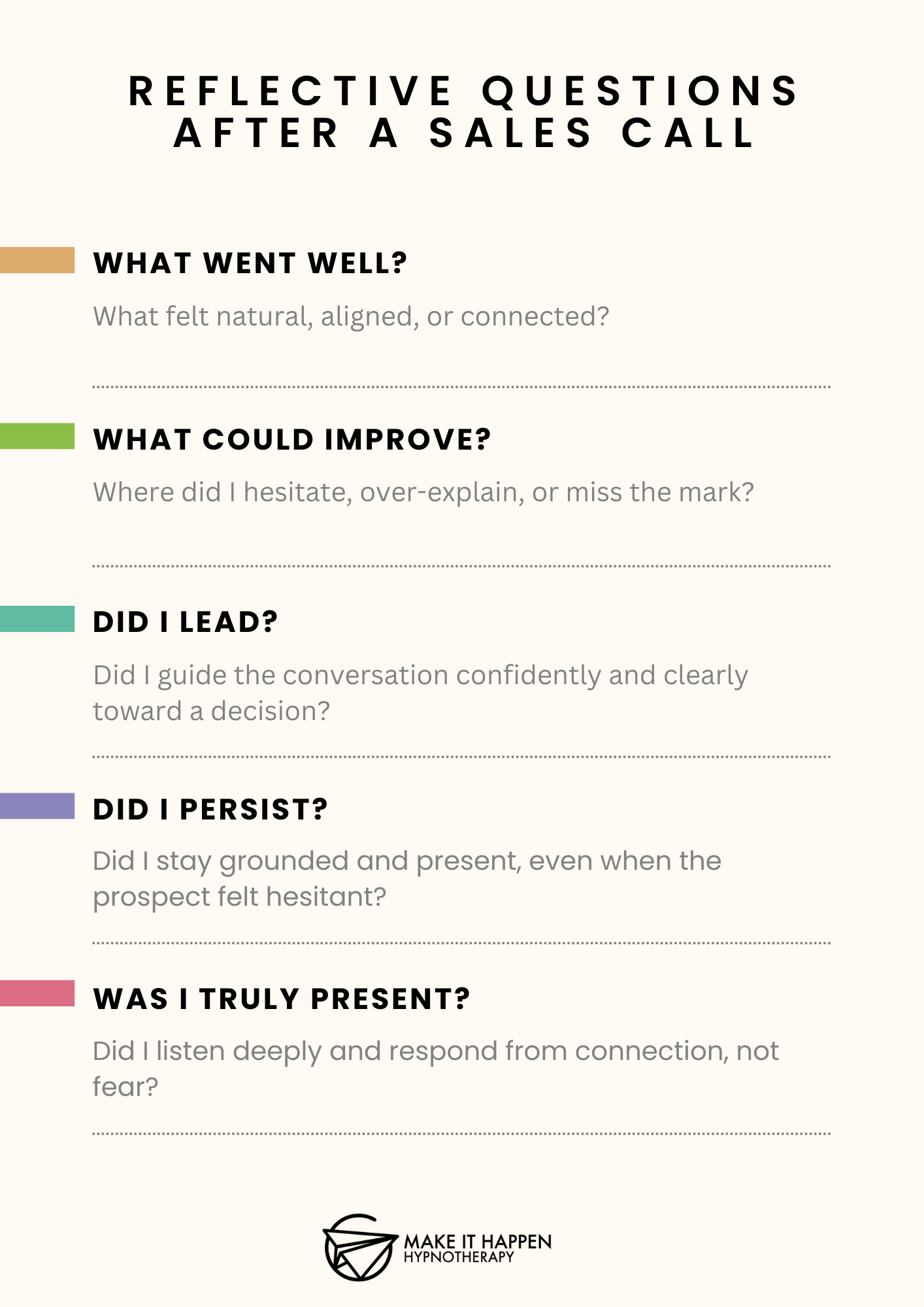Facts: Your expertise transforms lives. Your clients rave about the results you deliver. Yet when it comes to sales calls, something shifts inside you. Your voice wavers. Your pricing becomes negotiable.
The confident professional who delivers exceptional results suddenly feels like they are asking for too much.
This disconnect isn’t about lacking sales skills or needing better scripts. It is about reclaiming your confidence self—the part of you that knows your worth and can tell it to the world very clearly. Understanding how to be good at sales starts with healing negative subconscious patterns. They make selling feel like betraying your authentic self.
*clients’ names have been changed to maintain privacy.
Why You Overthink, Hold Back, and Doubt Yourself in Sales Conversations?
Sales conversations trigger your deepest emotional imprints. When you step into visibility, your nervous system scans for threats based on past experiences of:
- Rejection
- Criticism
- Being told you are “too much.”
This creates predictable patterns:
- Discounting your prices before clients even object.
- Over-explaining your value until you talk yourself out of the sale.
- Avoiding follow-up conversations that could lead to commitment.
- Prejudge the buyer’s financial ability assuming “They probably can’t afford this,” and undercut your own pricing without being asked.
- Mistake guiding the client with clarity for being manipulative. So, you hold back and avoid leading with confidence.
This hesitation leaves a leadership gap — and the client ends up in control, often choosing to “think about it” instead of making a decision.

Research demonstrates that your autonomic nervous system’s response to supposed social “threats” is the same as physical danger. Your body literally prepares for fight or flight when discussing money or asking for commitment.
Client Example: Selina was a business coach from Melbourne. She would spend hours crafting the “perfect” follow-up email after discovery calls. So, she often missed the optimal response window entirely.
The right approach helped her find out that her inner critic was protecting her from potential rejection by sabotaging her sales process.
These responses aren’t character flaws—they are protective mechanisms that once served you but now limit your ability to serve others at your highest capacity.
When your confidence self feels threatened, your sales conversations become performances rather than authentic exchanges of value.
Studies report that you may not think clearly when you feel psychologically unsafe. As a result, you may not be able to communicate persuasively during crucial sales moments.
What Is the “Confidence Self”—and Why You are Disconnected from It
Your confidence self isn’t about becoming someone else or adopting a sales persona. It is your integrated version who can hold space for both your expertise and your humanity without apology.
This part of you:
- Knows your value isn’t negotiable
- Speaks your truth without needing external validation
- Remains centered when others react or resist
- Makes decisions from clarity rather than fear
Yet this authentic confidence often gets buried under layers of conditioning.
- Perhaps you learned early that asking for things made you selfish.
- Maybe criticism taught you to become smaller instead of standing tall.
- Or people-pleasing became your main strategy to maintaining connection.
Client Example: Marcus was a Brisbane-based sales professional. He found out that his reluctance to call C-suite prospects came from childhood experiences.
He was punished when he tried to speak up to authority figures. So, his teenage self was still running his adult sales strategy.
Studies show that unresolved emotional patterns from your past continue to influence your professional behavior. Your conscious awareness may not know this. These patterns create internal conflicts where part of you wants to succeed—while another part sabotages your efforts to stay safe.
The disconnection from your confidence self often happens gradually. You strengthen neural pathways that reinforce self-doubt each time you:
- Compromise your boundaries
- Discount your value
- Prioritise others’ comfort over your truth
Learning how to be good at sales requires rewiring these deep-seated patterns at their source.
Research confirms that authentic self-expression correlates directly with success and satisfaction. When you operate from your confidence self, sales becomes a natural extension of service rather than an uncomfortable performance.
Why Sales Is More About Safety Than Strategy?
Conventional sales training focuses on:
- Techniques
- Scripts
- Closing strategies
While these tools have their place, they fail to address the fundamental issue: if your nervous system doesn’t feel safe, your body will override any technique you’ve learned.
This is why you might know exactly what to say but find yourself:
- Rushing through pricing conversations
- Apologizing for your rates
- Offering unnecessary discounts
- Avoiding eye contact or speaking in a higher pitch
- Feeling physically uncomfortable in your own body
The Polyvagal Theory developed by Dr. Stephen Porges explains how your autonomic nervous system constantly evaluates safety. That process is called Neuroception.
When you perceive threat—even in a business context—your body activates survival responses that shut down your capacity for connection and clear communication.
Client Example: Lisa, a holistic health practitioner, would physically shake during pricing conversations. She learned to create internal safety before client consultations with the right approach. Her revenue doubled within three months as her newfound stability translated into confident pricing discussions.
Somatic research from Peter Levine’s trauma studies demonstrates that the body holds memories of past experiences in your tissues and nervous system. These stored experiences affect your present-moment responses. They may create reactions that seem disproportionate to the current situation.
When your confidence self feels safe, several physiological changes happen:
- Your Vagus nerve activates, supporting calm alertness
- Stress hormones decrease, improving cognitive function
- Your voice naturally lowers and strengthens
- Eye contact becomes comfortable and magnetic
- Your presence expands rather than contracts
Understanding how to be good at sales means recognising that sustainable success comes from internal safety, not external techniques.
When you feel safe in your own value, others feel safe investing in what you offer.
How to Reconnect with Your Confidence Self?
Reconnecting with your confidence self requires working with both conscious and subconscious patterns. Surface-level affirmations and mindset work address only part of the equation.
Deep, lasting change happens when you engage the subconscious mind where these protective patterns originate.
Hypnotherapy for Confidence
Hypnotherapy accesses the theta brainwave state where core beliefs and emotional patterns are stored. Research shows that hypnosis creates measurable changes in brain activity, allowing for rapid rewiring of limiting beliefs and responses.
The process involves:
- Identifying the protective part that developed these patterns
- Understanding its positive intention (usually keeping you safe from rejection or criticism)
- Acknowledging and thanking this part for its service
- Updating its programming with new information about your current capacity and safety
- Installing new neural pathways that support confident expression
Hypnotherapy for confidence also involves Parts work and inner child healing, which addresses the younger aspects of yourself that may still be running outdated protection strategies. These parts often hold powerful gifts—creativity, intuition, authenticity. These parts only become available when they feel safe and integrated.
Client Example: Jennifer, a start-up founder preparing for Series A funding, worked with us to address her fear of investor presentations.
Through regression hypnotherapy, she discovered her pattern originated from being dismissed by teachers in primary school. Once this connection was made conscious and healed, her pitch delivery transformed completely.

Somatic Breathwork
This method rebuilds your capacity to stay present and grounded under pressure. The 4-7-8 breathing technique activates the parasympathetic nervous system, creating physiological safety that supports confident communication.
Voice and somatic practices help you embody your confidence self physically. Research shows that vocal training doesn’t just improve how others perceive you—it literally changes how you feel about yourself through embodied confidence.
When your subconscious beliefs align with your conscious goals, learning how to be good at sales becomes a natural expression of who you are rather than something you have to force.

Practical Steps to Build Sales Confidence in Real Time
While deep subconscious work creates lasting change, you can also use practical tools to access your confidence self in the moment. These techniques work by regulating your nervous system and anchoring you in your authentic power.
Before Sales Conversations
- Ground yourself physically: Feel your feet on the floor and take three deep breaths into your belly
- Use the 4-7-8 technique: Inhale for 4 counts, hold for 7, exhale for 8 to activate your parasympathetic response
- Connect with your “why”: Remind yourself of the transformation you provide and why it matters
- Set an intention: Choose to show up as service rather than performance
During Conversations
- Embrace strategic silence: Allow pauses after asking questions or sharing your investment
- Speak from your core: Keep your voice low and steady, breathing from your diaphragm
- Ask powerful questions: Redirect with curiosity rather than over-explaining when you feel uncertain.
- Stay present: Notice when you are future-tripping about outcomes. Return to the current moment.
Client Example: David, a real estate agent in Queensland, struggled with phone reluctance after deals fell through. Using our techniques, he developed a pre-call ritual that included grounding exercises and affirmations about his value to clients. His conversion rate improved by 40% within two months.
After Sales Call:
- Acknowledge your courage: Celebrate showing up whatever the result maybe.
- Reflect without judgment. Refine with intention. Ask yourself:
What Went Well?
What Could Improve?
Did I Lead?
Did I Persist?
Was I Truly Present?
- Release attachment: Trust that the right clients will recognise and invest in your value
The important thing about knowing how to be good at sales lies in consistency with these practices. Each time you choose presence over performance, you strengthen the neural pathways that support your confidence self.
Research from Dr. Joe Dispenza’s work on neuroplasticity shows that repeated conscious choices create new default patterns in the brain. The more you practice accessing your confident state, the more natural it becomes.

In a Nutshell
Authentic sales success comes from remembering who you are beneath the conditioning and fear. Your confidence self already knows how to communicate value with grace and power. When you heal what is blocking that natural expression, selling becomes an act of service rather than survival.
Ready to release the subconscious blocks keeping you from selling with confidence? Book your free consultation session at Make It Happen Hypnotherapy (MIHH) now. See how deep rewiring work can help you embody your confidence self in every business conversation.
FAQs
How Can Hypnotherapy Help With Sales Confidence?
Hypnotherapy accesses the subconscious mind where limiting beliefs about sales and self-worth are stored. It rewires deep-seated patterns that cause you to:
- Freeze during pricing conversations
- Discount your services
- Avoid follow-ups
By working in the theta brainwave state, hypnotherapy creates rapid changes in brain activity, allowing you to embody your confident self naturally. This approach addresses the root cause rather than just surface-level techniques.
Why do I Get Nervous When Talking About my Prices?
Your nervous system perceives pricing conversations as social threats, triggering the same fight-or-flight response as physical danger. This happens because past experiences of rejection or criticism have created protective patterns in your subconscious mind.
Your body literally prepares for threat when:
- Discussing money
- Causing voice wavering
- Rushing through conversations
- Apologising for your rates
Healing these stored emotional imprints allows you to discuss pricing from a place of safety and confidence.
How Can I Overcome My Fear of Rejection in Sales?
Fear of rejection is natural. Your nervous system perceives “no” as a threat to survival. This fear becomes manageable when you understand that rejection often isn’t personal. It is about timing, budget, or fit.
To overcome this fear:
- Reframe rejection as valuable feedback, not personal judgment.
- Practice grounding techniques before important conversations.
- Remember that confident persistence (not pushiness) often turns initial “nos” into eventual “yeses”.
Hypnotherapy specifically helps by rewiring the subconscious patterns that make rejection feel dangerous. This allows you to stay centered and curious instead of defensive when prospects hesitate.








